Related Research Articles
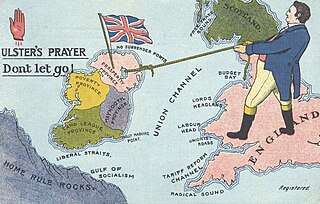
Unionism is a political tradition on the island of Ireland that favours political union with Great Britain and professes loyalty to the British Crown and constitution. As the overwhelming sentiment of Ireland's Protestant minority, following Catholic Emancipation (1829) unionism mobilised to keep Ireland part of the United Kingdom and to defeat the efforts of Irish nationalists to restore a separate Irish parliament. Since Partition (1921), as Ulster Unionism its goal has been to maintain Northern Ireland as part of the United Kingdom and to resist a transfer of sovereignty to an all-Ireland republic. Within the framework of a 1998 peace settlement, unionists in Northern Ireland have had to accommodate Irish nationalists in a devolved government, while continuing to rely on the link with Britain to secure their cultural and economic interests.
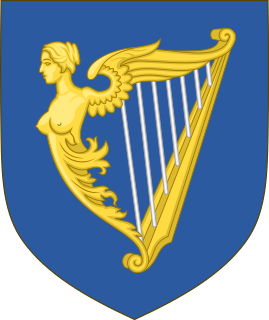
The Irish Parliamentary Party was formed in 1874 by Isaac Butt, the leader of the Nationalist Party, replacing the Home Rule League, as official parliamentary party for Irish nationalist Members of Parliament (MPs) elected to the House of Commons at Westminster within the United Kingdom of Great Britain and Ireland up until 1918. Its central objectives were legislative independence for Ireland and land reform. Its constitutional movement was instrumental in laying the groundwork for Irish self-government through three Irish Home Rule bills.

The Government of Ireland Bill 1886, commonly known as the First Home Rule Bill, was the first major attempt made by a British government to enact a law creating home rule for part of the United Kingdom of Great Britain and Ireland. It was introduced on 8 April 1886 by Liberal Prime Minister William Gladstone to create a devolved assembly for Ireland which would govern Ireland in specified areas. The Irish Parliamentary Party under Charles Stewart Parnell had been campaigning for home rule for Ireland since the 1870s.
The Ulster Unionist Labour Association (UULA) was an association of trade unionists founded by Edward Carson in June 1918, aligned with the Ulster Unionists in Ireland. Members were known as Labour Unionists. In Britain, 1918 and 1919 were marked by intense class conflict. This phenomenon spread to Ireland, the whole of which was under British rule at the time. This period also saw a large increase in trade union membership and a series of strikes. These union activities raised fears in a section of the Ulster Unionist leadership, principally Edward Carson and R. Dawson Bates. Carson at this time was president of the British Empire Union, and had been predisposed to amplify the danger of a Bolshevik outbreak in Britain.
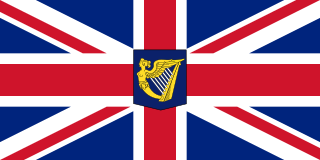
Ireland under British rule Refers to when Ireland was part of the United Kingdom of Great Britain and Ireland from 1801 to 1922. For almost all of this period, the island was governed by the UK Parliament in London through its Dublin Castle administration in Ireland. Ireland underwent considerable difficulties in the 19th century, especially the Great Famine of the 1840s which started a population decline that continued for almost a century. The late 19th and early 20th centuries saw a vigorous campaign for Irish Home Rule. While legislation enabling Irish Home Rule was eventually passed, militant and armed opposition from Irish unionists, particularly in Ulster, opposed it. Proclamation was shelved for the duration following the outbreak of World War I. By 1918, however, moderate Irish nationalism had been eclipsed by militant republican separatism. In 1919, war broke out between republican separatists and British Government forces. Subsequent negotiations between Sinn Féin, the major Irish party, and the UK government led to the signing of the Anglo-Irish Treaty, which resulted in five-sixths of Ireland seceding from the United Kingdom.

The Irish Unionist Alliance (IUA), also known as the Irish Unionist Party, Irish Unionists or simply the Unionists, was a unionist political party founded in Ireland in 1891 from a merger of the Irish Conservative Party and the Irish Loyal and Patriotic Union to oppose plans for home rule for Ireland within the United Kingdom of Great Britain and Ireland. The party was led for much of its existence by Colonel Edward James Saunderson and later by William St John Brodrick, Earl of Midleton. In total, eighty-six members of the House of Lords affiliated themselves with the Irish Unionist Alliance, although its broader membership was relatively small.
The Northern Ireland Civil Rights Association (NICRA) was an organisation that campaigned for civil rights in Northern Ireland during the late 1960s and early 1970s. Formed in Belfast on 9 April 1967, the civil rights campaign attempted to achieve reform by publicising, documenting, and lobbying for an end to discrimination in areas such as elections, discrimination in employment, in public housing and abuses of the Special Powers Act. The genesis of the organisation lay in a meeting in Maghera in August 1966 between the Wolfe Tone Societies which was attended by Cathal Goulding, then chief of staff of the Irish Republican Army (IRA).

Ulster loyalism is a strand of Ulster unionism associated with working class Ulster Protestants in Northern Ireland. Like other unionists, loyalists support the continued existence of Northern Ireland within the United Kingdom, and oppose a united Ireland. Unlike other strands of unionism, loyalism has been described as an ethnic nationalism of Ulster Protestants and "a variation of British nationalism". Loyalists are often said to have a conditional loyalty to the British state so long as it defends their interests. They see themselves as loyal primarily to the Protestant British monarchy rather than to British governments and institutions, while Garret FitzGerald argued they are loyal to 'Ulster' over 'the Union'. A small minority of loyalists have called for an independent Ulster Protestant state, believing they cannot rely on British governments to support them. The term 'loyalism' is usually associated with paramilitarism.

The partition of Ireland was the process by which the Government of the United Kingdom of Great Britain and Ireland divided Ireland into two self-governing polities: Northern Ireland and Southern Ireland. It was enacted on 3 May 1921 under the Government of Ireland Act 1920. The Act intended both territories to remain within the United Kingdom and contained provisions for their eventual reunification. The smaller Northern Ireland was duly created with a devolved government and remained part of the UK. The larger Southern Ireland was not recognised by most of its citizens, who instead recognised the self-declared 32-county Irish Republic. On 6 December 1922, a year after the signing of the Anglo-Irish Treaty, the territory of Southern Ireland left the UK and became the Irish Free State, now the Republic of Ireland.

The All-for-Ireland League (AFIL) was an Irish, Munster-based political party (1909–1918). Founded by William O'Brien MP, it generated a new national movement to achieve agreement between the different parties concerned on the historically difficult aim of Home Rule for the whole of Ireland. The AFIL established itself as a separate non-sectarian party in the House of Commons of the United Kingdom of Great Britain and Ireland, binding a group of independent nationalists MPs to pursue a broader concept of Irish nationalism, a consensus of political brotherhood and reconciliation among all Irishmen, primarily to win Unionist consent to an All-Ireland parliamentary settlement.
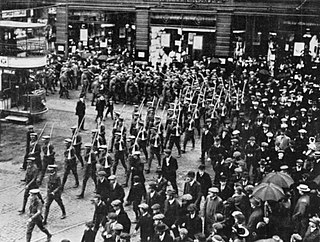
The Ulster Volunteers was an Irish unionist, loyalist paramilitary organisation founded in 1912 to block domestic self-government for Ireland, which was then part of the United Kingdom. The Ulster Volunteers were based in the northern province of Ulster. Many Ulster Protestants and Irish unionists feared being governed by a nationalist Catholic-majority parliament in Dublin and losing their links with Great Britain. In 1913, the militias were organised into the Ulster Volunteer Force (UVF) and vowed to resist any attempts by the British Government to impose Home Rule on Ulster. Later that year, Irish nationalists formed a rival militia, the Irish Volunteers, to safeguard Home Rule. In April 1914, the UVF smuggled 25,000 rifles into Ulster from Imperial Germany. The Home Rule Crisis was interrupted by the First World War. Much of the UVF enlisted with the British Army's 36th (Ulster) Division and went to fight on the Western Front.

Protestant Irish Republicans Nationalists are adherents of Protestantism in Ireland who also support Irish nationalism. Protestants have played a large role in the development of Irish nationalism since the eighteenth century, despite most Irish nationalists historically being from the Irish Catholic majority, as well as most Irish Protestants usually tending toward unionism in Ireland. Protestant nationalists have consistently been influential supporters and leaders of various movements for the political independence of Ireland from Great Britain. Historically, these movements ranged from supporting the legislative independence of the Parliament of the Kingdom of Ireland, to a form of home rule within the United Kingdom of Great Britain and Ireland, to complete independence in an Irish Republic and a United Ireland.
The Irish Conservative Party, often called the Irish Tories, was one of the dominant Irish political parties in Ireland in the 19th century. It was affiliated with the Conservative Party in Great Britain. Throughout much of the century it and the Irish Liberal Party were rivals for electoral dominance among Ireland's small electorate within the United Kingdom of Great Britain and Ireland, with parties such as the movements of Daniel O'Connell and later the Independent Irish Party relegated into third place. The Irish Conservatives became the principal element of the Irish Unionist Alliance following the alliance's foundation in 1891.

John Joseph Clancy, usually known as J. J. Clancy, was an Irish nationalist politician and Member of Parliament (MP) in the House of Commons for North Dublin from 1885 to 1918. He was one of the leaders of the later Irish Home Rule movement and promoter of the Housing of the Working Classes (Ireland) Act 1908, known as the Clancy Act. Called to the Irish Bar in 1887, he became a King's Counsel in 1906.

The Irish Home Rule movement was a movement that campaigned for self-government for Ireland within the United Kingdom of Great Britain and Ireland. It was the dominant political movement of Irish nationalism from 1870 to the end of World War I.
James Brown Armour (1841–1928), usually known as J. B. Armour, was an Irish Presbyterian minister who sought to rally Protestant opinion in the north of Ireland in support of tenant right and against landlordism, and, in his later years, in favour of Irish Home Rule and against threatened unionist resistance to an Irish national parliament.
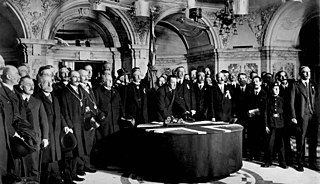
The Home Rule Crisis was a political and military crisis in the United Kingdom of Great Britain and Ireland that followed the introduction of the Third Home Rule Bill in the House of Commons of the United Kingdom in 1912. Unionists in Ulster, determined to prevent any measure of home rule for Ireland, formed a paramilitary force, the Ulster Volunteers, which threatened to resist by force of arms the implementation of the Act and the authority of any Dublin Parliament. Irish nationalists responded by setting up the Irish Volunteers "to secure the rights and liberties common to all the people of Ireland". Both sides then began importing weapons and ammunition from Germany, in the Larne gun-running and Howth gun-running incidents. HM Government's ability to face down unionist defiance was thrown into question by the "Curragh incident", when dozens of British Army officers tendered their resignations rather than secure arms against Ulster loyalist seizure, forcing a climb-down by the government. The crisis was temporarily averted by the outbreak of World War I. The Home Rule Bill was enacted, but its implementation was suspended for the duration of the war.
The Londonderry City by-election of 1872 was held on 23 November following the resignation of incumbent Liberal Party member of parliament Richard Dowse to become a Baron of the Exchequer. The Liberal vote was split as their candidate, Christopher Palles, was considered by Catholics as a "priest-hunter" for his prosecution of clergy as Attorney-General and denounced by Protestants for his views on education along denominational lines. The election was won by the Irish Conservative Party's Charles Lewis who secured a 174-vote majority. The election was the first Irish election to the British Parliament to be held by secret ballot.
Thomas Sinclair, was an Ulster-Scots businessman and politician who drafted the Ulster Covenant.

Robert Lindsay Crawford (1868–1945) was an Irish Protestant politician and journalist who shifted in his loyalties from Unionism and the Orange Order to the Irish Free State. He was a co-founder of the Independent Orange Order through which he hoped to promote Irish reconciliation and democracy. Later he became a committed Irish nationalist mobilizing support in Canada for Irish self-determination and serving the new Irish state as its trade representative and consul in New York City.